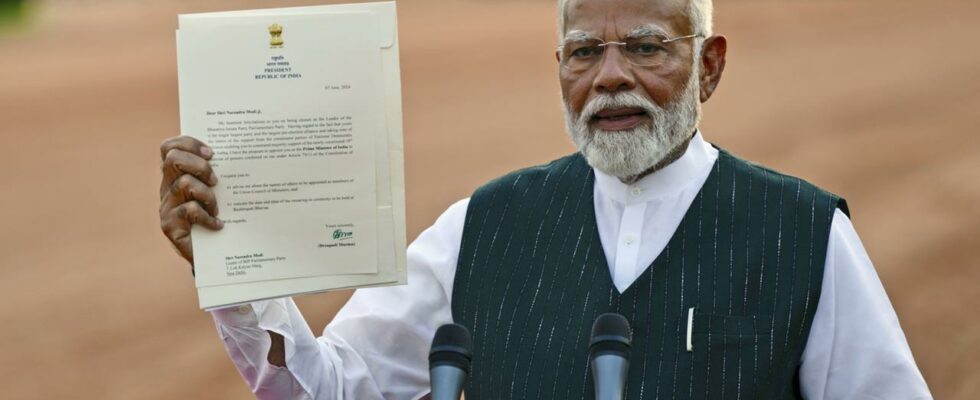Indian President Murmu has tasked Prime Minister Modi with forming a government, which is to be sworn in on Sunday evening. It is planned that 15 parties will participate in the coalition.
After the parliamentary elections in India, the current Prime Minister Narendra Modi is to lead a new government based on a 15-party coalition. He presented President Droupadi Murmu with letters of support from the National Democratic Alliance (NDA), whose votes give him a majority in parliament. Murmu then commissioned him to form a government. The new government is to be sworn in on Sunday evening.
The NDA alliance will strive for unity and will be successful, Modi said when announcing the government mandate. He had previously spoken to almost 300 members of his coalition in the Indian parliament and thanked them for their unanimous support of his government. The meeting was seen as a formality and a signal of demonstrative unity, after the leaders of the 15-party alliance had already pledged their support to Modi two days ago.
Third consecutive term
Modi had previously stated after his appointment as head of the NDA that the aim would be, among other things, to increase the savings of the middle class and improve their quality of life, since “the middle class is the driving force of the country”.
By agreeing on a coalition, Indian Prime Minister Narendra Modi has secured a third term at the head of government. He will thus become the second Indian Prime Minister to serve a third term. Before him, Jawaharlal Nehru achieved this, the first head of government since independence from Great Britain in 1947.
Economic discontent as a reason for election outcome
The fact that Modi is dependent on a coalition is seen as a setback, as his Bharatiya Janata Party (BJP) had won absolute majorities in 2014 and 2019. During this time, Modi ruled with an authoritarian hand. Experts believe that the main reasons for the BJP’s poor performance are unemployment and falling incomes, as well as rising prices.
The six-week parliamentary election in India ended on Saturday. More than 968 million people were called to vote, and 642 million did so. Modi’s BJP secured 240 parliamentary seats, which was 32 seats short of an absolute majority. In 2019, it had only won 303 seats. The main opposition party, the Congress Party, was able to almost double its result compared to the election five years ago and won 99 seats.

